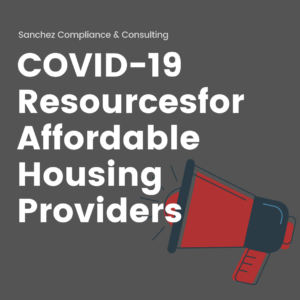We know you might be sick of this phrase, but we really are in unprecedented times. However, the real estate industry isn’t new to crises. We know the drill, and we need to head off the impending disaster.
COVID-19 created a unique affordable housing crisis, but property managers can protect themselves – and their tenants – by staying informed on key industry updates.
Key Statistics About the COVID-19 Impact on Rental Property
We’ve already been through one affordable housing crisis – many property managers were just starting to feel comfortable after the 2008 mortgage disaster.
Here’s what you need to know about how COVID-19 is impacting rental property:
- Struggling apartment tenants: National and local stay-at-home orders put almost 17 million Americans out of work. Unemployment contributed to nearly one-third of people being late on their rent payments in April.
- Economic stimulus packages: The CARES Act included economic relief in the form of funding from the U.S. Department of Housing and Urban Development (HUD). As of May 11, 2020, HUD has allocated over $4 billion under the Community Development Block Grant (CDBG) program.
While the CARES Act does provide funding to cover low-income housing and homeless people, it doesn’t offer a lot of support for apartment tenants.
What to Expect from the COVID-19 Affordable Housing Crisis in 2020
The coronavirus was unequivocally a surprise, and it put millions of Americans and businesses in a serious bind. This forced governments and property managers to act quickly using a combination of protective legal measures and financial assistance.
1. Changes in How Evictions are Handled
As part of ongoing efforts to keep people in their homes and apartments, many cities and states are facing pressure to delay evictions – one of many ways we’re all trying to manage this situation.
The Texas Supreme Court, for example, isn’t holding any eviction hearings until May 18, 2020, at the earliest. And in Austin, the mayor passed a city ordinance that prevents evictions until July 25.
2. Potential for Mortgage Forbearance
One of the measures offered by the federal government is a forbearance relief plan. This plan is designed to give multifamily property managers extra time to make payments.
Property owners that have qualifying Freddie Mac loans will be able to defer three months of payments on their multifamily property loans.
3. Creating Solutions to the Affordable Housing Crisis
Americans living in apartments have a slight disadvantage over their mortgage-paying counterparts. Congress didn’t offer a lot of protection for them in its stimulus package.
This means property managers will need to get creative to prevent mass disruption to their revenue stream, not to mention the loss of otherwise great clients who are in a tough spot.
Get Started with a Plan for the Affordable Housing Crisis
We know that everyone is feeling a little uncertain right now. However, we can collectively avoid a reenactment of the 2008 mortgage crisis by creating sustainable solutions that protect the bottom line while ensuring tenants can recover.
Are you ready to update your affordable housing compliance? Contact Sanchez Compliance & Consulting to get started today.


